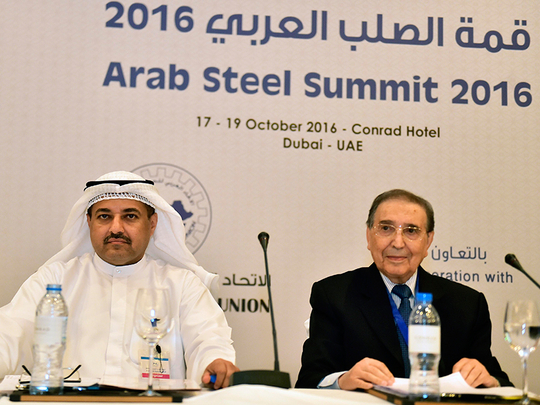
DUBAI: Steel producers in the Middle East face two more tough years before growth takes off again, delegates to the Arab Steel Summit 2016 heard.
Facing massive oversupply from Chinese producers, and the potential entry of Iran as a major local producer, many producers in the Middle East and North Africa have struggled to compete.
“Really, now, it’s serious,” said Engineer Ziad Kutayni, Damascus-based regional director of the Arab Iron and Steel Union.
“The Arab countries must do anything to protect their national industries. Otherwise factories will close, the people, the workers, will be retired, and this will make an economic and political crisis in each country.”
Kutayni, speaking after giving a talk on preparing a positive environment for Arab steel producers at the summit at the Conrad Dubai Hotel, said Chinese producers were currently producing 400 million tonnes a year more than needed, and the overcapacity was being dumped onto the market cheaply.
“It’s known to everybody that the Chinese product is the cheapest product in the world. This is because the Chinese government is supporting the steel industry in China,” he said.
George Matta, marketing director of EZZ Steel-Egypt, echoed Kutayni’s call in an interview after his talk on the regional steel industry outlook. Tariffs or duties, he said, were “intended to protect the developing local industry from unfair trade being practised by major exporters around the world.”
He added, “It’s a way to bring a level playing field for everyone. All we need is imports priced at a normal cost, a fair cost, not a subsidised cost. The local industry is able to compete with any imports provided that they are priced fairly.
Matta said deciding what a fair price would be was a technical issue, but the industry needed an instrument to prevent dumping of oversupply onto the market.
“We are talking about the minimum level of protectionism, and that is a permanent duty above 10 per cent,” he said. “Right now the Gulf, for example, the GCC, has 5 per cent. Egypt has zero per cent, which really will not support our position to be competitive vis-a-vis other major exporters, who might be dumping or exporting at subsidised cost.”
In his main talk, he listed some of the protection already in place, such as Algeria putting a quota on rebar imports earlier this year, Iran raising tariffs on imports, Morocco putting anti-dumping duties on float rolled products from the EU and Turkey, and the GCC beginning an investigation into coated flats imports.
Matta said the region’s cutback in spending due to lower oil prices had resulted in slow growth in the steel sector, but this varied within the region.
“We have North Africa still growing at a reasonable rate, we have the GCC countries in a stagnant mode this year and possibly next year. Overall I think the Mena [Middle East and North Africa] region as a whole will continue to grow, albeit at a slower rate than in the past.
“As oil prices move up slightly from next year — the level we’re expecting by the end of the year should be $60 [Dh220.2], moving up again to $70 by the end of next year — that should make the budget break even for most GCC countries. But in the meantime you will see a cutback in spending. Already Algeria has announced 9 per cent, and next year will be about 15 per cent, Saudi Arabia, we know the situation there, the UAE probably will remain stagnant.
“It’s a mixed bag, but on the whole I think the region is in a positive mode going forward.”
In his main talk he pointed out Iran’s production volumes had increased sharply over the past two years, with significant activity in billet sales in the last six months, and highlighted several large capacity expansions currently underway.
The Islamic republic, he said, may emerge as a new regional powerhouse in the sector.











